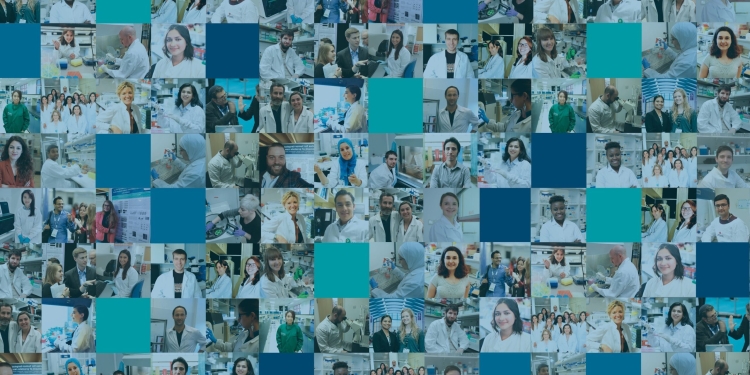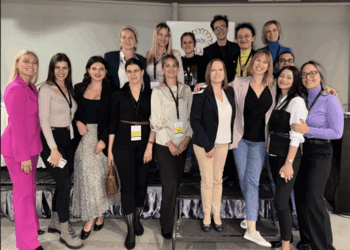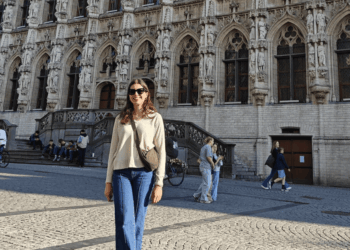Merve Soganci is a PhD student at Dokuz Eylul University in Turkey who received an EACR Travel Fellowship to visit and work at the Karolinska Institute in Sweden between September and December 2024.
The EACR, with support from Worldwide Cancer Research, provides Travel Fellowships of up to €3,500 to enable early-career cancer researchers to gain new skills through a short-term visit to a lab or research group in another country.
You can read about other Travel Fellows and their experiences here.
 Name: Merve Soganci
Name: Merve Soganci
Job title: PhD student
Home institute: Dokuz Eylul University, Turkey
Host institute: Karolinska Institute, Sweden
Dates of visit: 11 October – 10 January 2025
Research: Multiple myeloma is a type of cancer caused by the uncontrolled growth of plasma cells in the bone marrow. We aimed to study CAR T therapy, which targets cancer cells using the body’s warrior cells, T cells. This treatment strengthens T cells, enabling them to fight cancer more effectively. However, in some patients, the therapy may fail or cause side effects. Therefore, we developed a new approach to support T cells, aiming to enhance treatment effectiveness while reducing side effects. Our goal is to provide a safer and more effective therapy.
Why did you choose to apply for an EACR Travel Fellowship?
I had been invited to visit the Karolinska Institute, but I had to find a grant to take advantage of this opportunity, and I had a very limited period. According to the KI Institute’s conditions, I could not take advantage of this opportunity if I could not secure the necessary funding. At this point, the EACR Travel Fellowship was a great support for me.
Why did you choose the host lab?
The Karolinska Institute is one of the best research Institutes in the world. One of the best places to start my PhD thesis was in Alici’s laboratory. Especially in the field of multiple myeloma and immunotherapy, they have a very successful team. Their research coincides with my thesis topic. It is perfect environment for me to work in depth in this field. I personally experienced how right that decision was during my time there.
“I think the working environment is very important and Karolinska does this very well”
Can you summarise the research you did?
Interleukin-1 receptor associated kinase inhibitors (IRAKs) can be an exciting therapeutic option in Multiple Myeloma (MM). IRAKs are key mediators of innate immunity. There are 4 IRAK genes, all of which have been implicated in hematological cancers. IRAK 1, 2 and 4 play overlapping roles by providing pro-survival signalling, while IRAK3 has been reported to have immunosuppressive properties by inducing the M2 phenotype in tumour-associated macrophages. Targeting of these molecules has the potential to increase the efficacy of T-cell directed immunotherapies in MM. In our research, we conducted preliminary studies on the destruction of neoplastic plasma cells by the combination of IRAK inhibitors with Gprc5d in the MM cell lines/patient samples.
This study is designed to understand the potential of immunotherapy in hematological malignancies, particularly MM, to define the role of IRAK genes in this therapy and to gain important information for future immunotherapy strategies. We believe this is a promising step towards the development of new and effective treatments, particularly in the fight against MM.

Describe a typical day on your visit.
Winter in Sweden is dark and grey, as I have experienced. Unfortunately, the sunny winter months in Izmir, where I live, did not allow me to get used to this weather. But I didn’t lose my motivation because I wanted to come here so much. The lab was so active, and my colleagues were so nice. I didn’t pay much attention to the outside world. I spent a lot of time in cell culture. The coffee breaks between experiments, called fika in Sweden, were very enjoyable too. I also had easy access to the latest information and studies in my field. Because I attended regular seminars every week. The HERM seminars were usually held every Monday and delivered by distinguished experts in various fields related to hematological research. The SAP seminars were held every Wednesday. The series is organized and chaired by a working group consisting of PhD students and postdocs at HERM.
What were you able to do that you could not have achieved in your home lab?
I learned a lot about immunology, especially about T cells and NK cells. I learned how to include these cells in my studies and plan experiments. I have also had the opportunity to see the methods that are commonly used in this field. In my current work and in our new studies, I am sure we will include more immunology. When I returned home, I presented to my friends in my lab and let them know what I’d learned. Together we discussed how we could use immunology in our active projects.
Was the host institution very different from your own?
My home lab is a cancer research laboratory focused on Leukemia biology, genetics and cytogenetics. Specifically, it is interested in the role of phenotypic plasticity of cancer cells and therapy resistance. It is not an immunology lab and does not have experience with studying immune cells. Furthermore, my university does not have a basic immunology research laboratory. Host lab is renowned for their work on investigating NK cell function in patients with multiple myeloma. The lab is focusing on the optimisation and clinically adapt genetic modification strategies to retarget NK cells to tumour with limited off target effects and toxicity profiles. In this way, I had the opportunity to get many ideas that supported and developed my PhD thesis.

Did you take part in any interesting local activities?
At weekends I explored Stockholm, visited Nordiska, Vasa and Fotografiska museums, attended a candlelight concert I was curious about, Christmas markets and getting lost in Gamla Stan streets. I also had the chance to attend the Nobel Prize lecture on 08 December 2024.
I attended “International Researchers in Stockholm” on 02 December 2024 and the “HERM Christmas Dinner” on 12 December 2024. I had the opportunity to experience the local tastes of Sweden at both events. It was a great experience to discover the different flavours of Swedish cuisine. They were welcoming and friendly to everyone I met there.
The “International Researchers in Stockholm” event took place at the Stockholm City Hall and had a charming atmosphere. I had the opportunity to meet and exchange ideas with researchers from different fields. This event helped me to build a wide academic network. Thanks to these events, I felt at home in Sweden and had moments that made me say “I’m glad I came here!”

Did you have a personal mentor or anyone who particularly helped you?
I had worked actively under the supervision by Dr Muhammad Kashif, Research specialist, in the Multiple Myeloma Group at HERM at the Karolinska Institute. He was the first person that I went to when I needed to do something. We also discussed the results of my project and planned the next experiments.
Does your lab plan to do any future collaboration or publication with the host lab?
Depending on the availability of new opportunities, it is possible that additional immunological studies will be carried out after the return to the Karolinska Institute. After our experiments are completed, we plan to publish our results and present them at international congresses.
What was a personal highlight of your trip?
It was very important to start my PhD thesis at Karolinska. I was able to develop my project with their experience and suggestions. Although I thought it would be difficult to adapt to a new country and laboratory, it was not the case. On the contrary, I had no idea how the 3 months had passed. Our experimental results being in support of our hypothesis reminded me how valuable it was for me to be here.
Have you brought back any specific knowledge or technique that has benefited your home lab?
I worked with MM cell lines for the first time. I experimented with MM-specific drug doses. Then I carried out experiments on the degranulation of the NK-92 cell line. I finished measuring using the FACs. I learned which parameters and combinations to apply in Karolinska. This enabled me to continue doing these experiments when I return home laboratory.
How has the trip inspired you in your research?
When I first came to the lab, I had a lot of training. The lab manager showed me every part of the lab. I was told what I had to do in case of an emergency and then I was allowed to start working in the lab. It was a laboratory in which everyone was very active and was allowed to work in an efficient way. Anyone coming as an external scientist was equal to their own scientists. I never felt excluded, on the contrary, everyone was friendly and helpful. Therefore, I could successfully plan my experiments and get my results. I think the working environment is very important and Karolinska does this very well.
Want to find out more?
If you are interested in applying for the Travel Fellowship scheme, please click here for more information: EACR Travel Fellowships.








